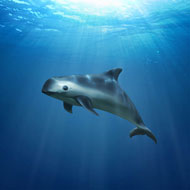
WWF calls for urgent global action
The critically endangered vaquita porpoise is facing imminent extinction unless steps are taken to address illegal fishing, WWF has said.
There are less than 30 vaquita left in the world, making it the most endangered marine mammal. The population plummeted by 90 per cent since 2011 as a result of gillnet fishing.
Illegal fishing for the critically endangered totoaba, which is used in traditional Chinese medicine, results in vaquita and other marine mammals being caught as bycatch when gillnets are used. The swim bladder of the totoaba fish is highly prized on the Asian markets, believed to cure a variety of illnesses and diseases.
A two-year ban on gillnets is due to expire at the end of May and WWF says that, despite some efforts by the Mexican Government, it has not been able to enforce the ban effectively, resulting in ‘unabated’ illegal fishing and drastic declines in the vaquita population.
Jorge Rickards, acting CEO of WWF-Mexico, said: “Having discovered the vaquita less than 60 years ago, we humans have now brought it to the brink of extinction. Their incredibly low numbers are a stark reminder of how our efforts to protect this incredible species and its habitat are falling short. Unless we act decisively today, we could lose the vaquita forever.”
According to WWF the vaquita, which is found only in the upper Gulf of California, could be extinct by 2018. Campaigners are calling for urgent global action, including a permanent, fully enforced gillnet ban, as well as proper enforcement of existing laws to stop illegal fishing and end the totoaba trade between Mexico and China.
Abandoned nets, or ‘ghost nets’ should also be removed to prevent them from catching and killing wildlife.
There is a need to provide existing, alternative fishing gear and to gain the support of local fishing communities. WWF is urging the Mexican, US and Chinese governments to work together to halt the illegal transport and sale of totoaba products. The UNESCO World Heritage Committee and CITES are being called on to hold Mexico and other governments to account if they do not take action to protect the Gulf of California.
Efforts to protect vaquita include proposals to capture the remaining population and establish a captive breeding programme. However, WWF believes that while this may be necessary as a “last resort”, its recent analysis underscores the risks involved. Any ex-situ plan must be directly linked to a long-term conservation programme for wild vaquita and their habitat, the organisation says.
A healthy Gulf of California is not only key to the vaquita’s survival, it is also vital to other marine species, and the local economy. The site is home to many ecologically and economically important marine populations, and also supports half of Mexico’s total fisheries production, which provides income, food and livelihoods to local communities.
Illustration © Greenpeace/Marcelo Otero



 RCVS Knowledge has welcomed Professor Peter Cockcroft as editor-in-chief for Veterinary Evidence.
RCVS Knowledge has welcomed Professor Peter Cockcroft as editor-in-chief for Veterinary Evidence.